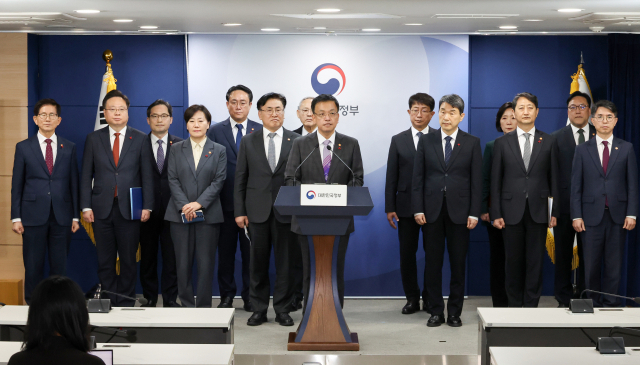
As the political situation surrounding President Yoon Suk Yeol remains uncertain, concerns are rising regarding critical economic measures necessary to stimulate the country's slowing growth.
Following a failed parliamentary vote on his impeachment, the leader of the ruling party has indicated intentions to push for the president's resignation. The main opposition party has called for Yoon to step down immediately, threatening to submit motions for his removal weekly.
Key economic issues, including discussions on a 677 trillion won ($475.4 billion) state budget for 2025 and upcoming government economic policy announcements, have been sidelined amid the political turmoil.
Prime Minister Han Duck-soo emphasized the urgency of addressing the budget proposal, stating that it is essential for the normal operation of national affairs during emergencies. He highlighted the need for timely execution of the budget to support economic recovery.
Finance Minister Choi Sang-mok reassured that South Korea's economic system remains robust, with effective government contingency measures in place. He noted that maintaining external creditworthiness is a top priority and outlined plans for direct engagement with international credit rating agencies.
Stock and foreign exchange markets have already reacted negatively to the political instability. Analysts warn that the ongoing volatility could adversely affect consumption and investment, further impacting the real economy.
Market observers predict a downward trend in the equity market as political uncertainty continues to exert pressure, compounded by challenges facing key export industries and potential tariff policies from the incoming U.S. administration.
On Friday, the benchmark Kospi index fell 1.78 percent, dipping below the 2,400 mark, while the Kosdaq reached its lowest level in over four years. The Korean won also depreciated significantly, hitting a two-year low against the U.S. dollar.
Economic forecasts for next year have been downgraded, with the Bank of Korea citing external factors such as tariff threats and increased competition from Chinese exporters. The central bank has revised its growth outlook to 2.2 percent for this year and 1.9 percent for the following year.
Global economic institutions and investment banks are projecting a bleak economic future for Korea, with some suggesting that a growth rate of 1 percent may become the new normal. Recent estimates from various organizations indicate a growth rate of around 1.9 percent for next year, not accounting for the ongoing political developments.
Major investment banks have also lowered their GDP growth projections for Korea, reflecting the prevailing economic uncertainties.
위기 속에 처한 윤석열 대통령의 운명이 예상보다 오랜 시간 동안 불확실할 것으로 보이면서, 국가의 경제 성장 둔화를 촉진할 필요가 있는 긴급 경제 조치를 두고 우려가 커지고 있다.
토요일의 탄핵 투표 실패 이후, 여당인 국민의힘의 한동훈 대표는 일요일 윤 대통령의 사퇴를 추진하겠다고 강조했다. 반면, 주요 야당인 민주당은 윤 대통령의 즉각적인 사퇴를 요구하며 매주 그를 해임하기 위한 동의안을 제출하겠다고 위협했다.
677조 원 규모의 2025년도 국가 예산안 논의와 내년 급변하는 글로벌 경제 환경에 대한 한국 산업의 지침이 될 정부 경제 정책 방향 발표를 포함한 긴급한 경제 사안들이 지연되면서 주요한 기로에 놓인 상황이다.
한덕수 총리는 일요일에 예산안 신속 처리를 간곡히 요청하며 금융 및 외환 시장을 면밀히 모니터링하는 비상 시스템을 운영하겠다고 약속했다.
그는 "비상 상황에서도 국가 업무가 정상적으로 운영되려면 정부가 제출한 예산안과 관련 법안의 통과가 무엇보다도 필요하다"고 말했다.
"예산이 최대한 빨리 확정되고 각 부처가 적시에 집행을 준비할 때만이 어려운 시기에도 경제와 국민의 삶이 제때 회복될 수 있다."
이날 각 부처 장관들과의 회의 뒤에, 최상목 재정경제부 장관 또한 "한국의 경제 시스템은 단단하며 정부의 비상 조치가 효과적으로 작동하고 있다"고 강조했다.
그는 "최우선 과제가 외부 신용도"라며, 정부가 국제 신용 평가 기관들과 직접 소통하고, 주요 글로벌 기구 및 국가로 재정 협력 사절단을 파견하며, 해외 투자자를 위한 브리핑을 진행할 계획이라고 덧붙였다.
주식 및 외환 시장은 이미 지난 주의 충격으로 인해 위축된 상태다. 금융시장의 안정을 위해 적절한 정책 도구를 사용하는 것이 핵심 과제가 될 것이며, 이는 기존의 강달러와 같은 하방 압력에 대응하기 위함이다.
한국산업경제연구원 이소라 연구원은 "부정적인 사이클을 끊는 것이 중요한 문제"라며 "정치적 불안정성으로 인해 금융 시장이 부정적인 영향을 받을 경우 소비 축소와 투자 지연으로 이어져 결국 실물 경제에도 파급 효과를 미칠 수 있다"고 말했다.
시장 관계자들은 정치적 불확실성이 이미 반도체와 2차 전지와 같은 주요 수출 산업의 경쟁력 둔화와 맞물려 시장에 압박을 가하고 있어, 국내 주식시장이 연말까지 하락세를 보일 것이라고 예상하고 있다.
금요일, 코스피 지수는 1.78% 하락하며 심리적 저지선인 2,400 이하로 떨어졌고, 코스닥은 4년 이상 만에 최저 수준을 기록한 뒤 손실을 줄였다.
원화의 추가적인 가치 하락은 예상되지만 제한된 범위 내에서 이뤄질 것으로 보인다.
윤 대통령이 화요일 비상계엄을 선언한 직후, 원화는 달러당 1,430원으로 2년 만에 최저치를 기록했다.
다이신증권의 이주완 애널리스트는 "정치적 불확실성이 해소될 때까지 원화는 낮은 수준을 유지하며 높은 변동성을 보일 것"이라고 말했다.
내년 수출 전망이 어둡다는 것도 경제에 부담을 주는 또 다른 요소다.
이창용 한국은행 총재는 미국 대통령 선거에서 도널드 트럼프의 관세 인상 위협과 중국 수출업체들의 경쟁력 강화를 내년 수출 성장률 하향 조정의 이유로 꼽았다. 한국은행은 올해 성장률을 2.2%, 내년 성장률을 1.9%로 하향 조정했다.
글로벌 경제 기관 및 투자은행의 비관적인 전망에 따르면 한국의 경제 성장률이 1%가 새로운 기준이 될 수 있다고 한다.
금요일, ASEAN+3 거시경제 및 연구 사무소는 내년 한국 경제 성장률을 1.9%로 예측했으며, 이번 주 탄핵 절차 및 계엄 선언과 관련된 변수를 반영하지 않았다.
주요 투자은행들은 예상치를 낮추고 있다. 씨티그룹은 한국의 2025년 GDP 성장률 전망을 1.8%에서 1.6%로 하향 조정했으며, UBS, 노무라, JP모건은 각각 1.9%, 1.7%, 1.7%로 전망치를 줄였다.
